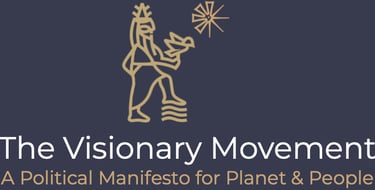SYNAPTOCRACY
Replacing broken politics with a system powered by knowledge and wisdom.


An Innovative Governance Model That Transcends Traditional Frameworks
We will establish Synaptocracy: a governance model that replaces traditional democracy, fostering interconnectedness, adaptability, and collective wisdom to ensure a harmonious and responsive society.
"Synaptocracy", derived from "synapse" (the junction between two nerve cells) and "kratos" (Greek for power or rule). This model emphasises interconnectedness, rapid information exchange, and collective decision-making, akin to the neural networks in the human brain.
Synaptocracy: Key Features
1. Decentralised Decision-Making
Power is distributed across various communities or sectors, ensuring that decisions are made closer to the affected populace, promoting responsiveness and accountability.
2. Dynamic Representation
Representatives are selected based on expertise and subject to periodic evaluations, ensuring that stewardship remains highly competent and adaptable to changing circumstances.
3. Enhanced Civic Engagement
Citizens participate directly in policy discussions through digital platforms, fostering a culture of continuous engagement and collective problem-solving.
4. Transparent Information Flow
Open data systems ensure that information is accessible to all, reducing misinformation, eliminating the need for the Freedom of Information Act, and enabling informed decision-making.
5. Adaptive Governance
Policies are regularly reviewed and adjusted based on feedback and changing conditions, ensuring that the system remains resilient and forward-looking.
By embracing the principles of Synaptocracy, we can, as a society, aspire to create a system that is more responsive, inclusive, and attuned to the complexities of the modern world.
Building upon the concept of Synaptocracy, we can explore additional elements to enhance this model.
1. Dynamic Citizen Assemblies
Incorporating randomly selected citizen assemblies to deliberate on specific policy issues. This approach ensures diverse perspectives are considered, fostering inclusivity and reducing the influence of entrenched interests. Such assemblies have been effective in various contexts, providing thoughtful recommendations on complex matters.
2. Modular Governance Structures
Developing a modular approach to governance, allowing communities to adopt and adapt policies that best suit their unique needs. This flexibility encourages innovation and responsiveness, enabling governance structures to evolve organically.
3. Emphasis On Deliberative Processes
Where decision-making is based on thorough discussion and consensus-building among citizens. This method seeks to overcome polarisation and create policies that reflect collective reasoning.
By integrating these elements, Synaptocracy evolves into a more comprehensive governance model that emphasises interconnectedness, adaptability, and collective wisdom. This system aspires to create a society where governance is a dynamic, inclusive, and responsive process, aligning with the aspirations of those seeking transformative change.
“A democracy is nothing more than mob rule,
where fifty-one percent of the people may take away
the rights of the other forty-nine.”
Thomas Jefferson


CASE STUDY:
National Identity Cards
In a scenario where a national vote on implementing ID cards resulted in a narrow margin—49% in favour and 51% against, our solution would respect both perspectives while upholding the integrity of the system.
In a Synaptocracy, striking this balance fairly would be achieved by implementing an opt-in/opt-out ID card system.
This system respects individual choices, offering options without imposing compulsory requirements, thereby accommodating diverse perspectives and upholding personal freedoms.
Opt-In ID Card System
Voluntary Participation: Citizens would be free to choose whether to obtain an ID card, ensuring that those who support the initiative can participate, while those who oppose it are not compelled to comply.
Incentives For Adoption: To encourage participation without mandating it, the Vicontenate will highlight the inherent benefits to ID card holders, such as convenience, streamlined access to public services, expedited processing in administrative tasks, and personal peace of mind.
Public Awareness Campaigns: We will educate citizens on the advantages of possessing an ID card, allowing individuals to make informed decisions based on their personal preferences and needs.
Opt-Out ID Card System
Unrestricted Opt-Out: Individuals can opt out of the system at any time, without penalty or conditions, if they felt their privacy was compromised.
Enhanced Privacy Protections: The system will incorporate robust data protection measures, including encryption and strict access controls, to safeguard personal information.
Independent Oversight: An independent body will oversee the implementation and operation of the ID system, ensuring compliance with privacy standards and addressing any grievances.
GET IN TOUCH
SUBSCRIBE FOR UPDATES
WhatsApp: +44 (0)7413 47 46 48
© 2025. All rights reserved.


FOLLOW
Support the movement: Make a Donation








